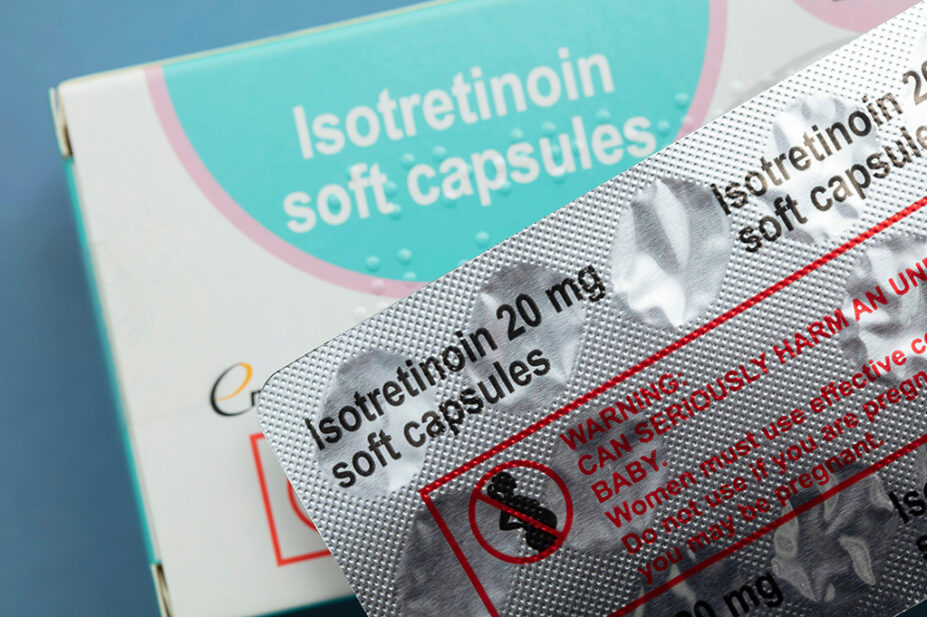
Ink Drop / Alamy Stock Photo
A review carried out by the Commission on Human Medicines (CHM) has concluded that isotretinoin should only be prescribed to patients aged 12–18 years if their acne is severe enough and other standard treatments have been sufficiently tried and have not worked.
It also recommended that initiation of isotretinoin treatment in this patient group should require the agreement of two prescribers — a level of supervision not currently required for any other medicine prescribed by dermatologists.
The recommendations were published on 26 April 2023, following a review carried out by the CHM’s Isotretinoin Expert Working Group, into the safety of the acne drug, which is commonly known by the brand name Roaccutane (Roche Products Ltd).
Isotretinoin can be an effective last-line treatment for severe forms of acne that have not responded to standard treatments, such as antibiotics and topical treatments. However, there have been ongoing concerns from patients and members of the public about side effects associated with the drug, including psychiatric and sexual side effects, such as depression and erectile dysfunction, that sometimes continue after treatment with isotretinoin has been stopped.
The safety review concluded that the gaps in the available evidence meant it was impossible to say if isotretinoin definitely caused short- or long-term side effects, but it was agreed that the individual experiences of patients and families were still a cause for concern.
The CHM’s final report outlines the data considered, the review process and key recommendations, which will be taken forward by the Medicines and Healthcare products Regulatory Agency (MHRA), to support the safe use of isotretinoin as an effective treatment for severe forms of acne while mitigating the possible risks.
The CHM has also advised further strengthening of the safety measures for isotretinoin to include new warnings about sexual dysfunction, which may continue after treatment with isotretinoin has stopped, and that the warnings about psychiatric disorders be revised to reflect the unknown frequency with which these may occur.
Other recommendations include that patients and their families should receive earlier and better information about the risks of isotretinoin, so they can make an informed decision about their treatment; that there should be consistent monitoring of a patient’s psychiatric and sexual health so that any problems can be spotted early; and that more research should be carried out into the risks of psychiatric and sexual side effects associated with isotretinoin, such as a database to record possible side effects.
The report concluded that there should be “tighter controls” on first prescribing isotretinoin to young people (aged 12–18 years) so that it is only started when doctors agree the acne is “severe enough to justify it” and that other standard treatments have been sufficiently tried and have not worked.
Alison Cave, chief safety officer at the MHRA, said: “Uncontrolled and severe acne can have a significant impact on a patient’s mental wellbeing and can lead to permanent scarring.
“For these individuals, isotretinoin may be the only effective treatment option.
“No medicine is completely free of risk and the conclusion of the independent CHM is that, on balance, the benefits of isotretinoin for severe acne continue to outweigh the risks, but action should be taken to make sure patients are better aware of them, that they are carefully monitored throughout treatment, and that for patients under the age of 18 years there is additional scrutiny on isotretinoin prescribing.”
Cave added that the MHRA was now working to implement the CHM’s recommendations with advice from an implementation advisory group.
Henrietta Hughes, patient safety commissioner for England, said she welcomed the new recommendations to strengthen the safe use of isotretinoin.
“Courageous patients and families have shared their experiences with me and the review. Care pathways need to be standardised with better information, better assessment and closer monitoring.
“It’s vital that patients and families are counselled about the risks of psychiatric and sexual dysfunction side effects before the treatment is started and so make informed decisions about care.”
At the Clinical Pharmacy Congress, held in London on 14 May 2022, Paul Brown, clinical lead at NHS Digital, confirmed that the organisation was considering developing a register of patients prescribed isotretinoin, as well as other high-risk medicines, during pregnancy.


